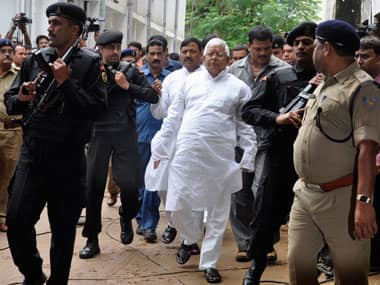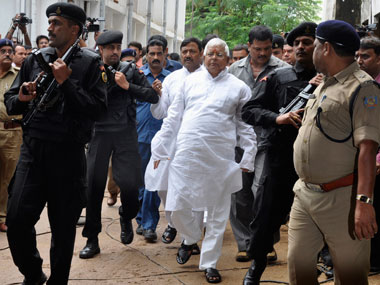How Lalu Prasad Yadav must wish that the Rashtriya Janata Dal had replicated its performance in the 2004 Lok Sabha elections (when it won 21 seats) in 2009 (when it won just 4). In another reality, it may have been his one time compatriot in VP Singh’s Janata Dal, and fellow OBC-Muslim strongman Mulayam Singh Yadav, who would have been facing the music of justice, and not Lalu. But in that alternate realm, Lalu would have needed to be strong enough to ensure the survival of the Congress-led UPA Government, as he had done as a most loyal ally in UPA 1. As it currently stands, it is Mulayam (and indeed Mayawati) who bought their insurance against justice by winning 20 odd seats each in 2009. [caption id=“attachment_1144309” align=“alignleft” width=“380”]  It was not that Lalu is corrupt, it’s because he is powerless: Reuters image[/caption] Lalu was a fallen politician much before the 30 September trial court verdict which declared him guilty in the fodder scam case. His conviction, and that of fellow three-time Bihar Chief Minister Jagannath Mishra, isn’t evidence of a system cleansing itself. It is simply the nailing of politicians who no longer have the power to beat the system. The fig leaf of power had long been stripped away leaving them vulnerable, even to courts. Lalu isn’t the first high-profile politician convicted for corruption in India. In 2000, PV Narasimha Rao, a former Prime Minister of India, was convicted of corruption by a trial court, in the infamous Jharkhand Mukti Morcha bribery case when he was alleged to have ‘bought’ MP’s to save his Government in a confidence vote in 1993. There could not have been a more powerful deterrent to the polity than the conviction of a former Prime Minister. But it wasn’t. Narasimha Rao was already a fallen politician, far removed from the trappings of power, when his conviction happened. He has been abandoned by his own Congress Party. His conviction was overturned by a High court two years later when he was ailing at the age of 83. He died a lonely man in considerable financial difficulty a year later. Lalu Yadav must still hope that like Narasimha Rao, he will be eventually acquitted by a higher court. At 65, he can still look forward to an active political life. But even if he wins no reprieve, he will be remembered by fellow politicians as a case study, not of a politician who was convicted for corruption but as one who suffered because he lost grip of the levers of political power. Of course, the perception of corruption cost him popular support in Bihar, but not before he won three consecutive terms in office for his party. More than corruption, it was the complete lack of governance which he (and his wife Rabri) presided over that spelled his doom. Once he lost Bihar to the infinitely more efficient and honest Nitish Kumar, in 2005, the road to comeback was as potholed as the state of the roads that Lalu had bequeathed to his predecessor. Lalu had been to jail before in the mid 1990s, but then he was at the peak of his political power. The Government of Bihar was effectively run from jail. But now, after having lost most of his political clout, Lalu will find jail a lonelier place. Will the plight of Lalu instil the fear of justice into the minds of other corrupt politicians? Unlikely, as long as they remain confident of retaining a modicum of power. The system can then be manipulated as Mulayam and Mayawati have shown. India is yet to send an incumbent powerful politician to jail. What it might do though is to make politicians more fearful of the wrath of the people. More than the awfully slow wheels of justice, it is the judgment of the people that politicians need to be afraid of. The fact is that politicians fall from grace not when they convicted in court, but when they are consigned to the dustbin of history by those who gave them access to the levers of power if the first place. Lalu found out in May 2009, not September 2013.
Lalu’s conviction, and that of fellow three-time Bihar Chief Minister Jagannath Mishra, isn’t evidence of a system cleansing itself. It is simply the nailing of politicians who no longer have the power to beat the system
Advertisement
End of Article


)
)
)
)
)
)
)
)
)



